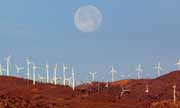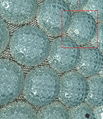


[NPR–Science Friday] Construction is now under way on the world's biggest wind farm in California's Mojave Desert. Federal and state regulators have given the green light to several large solar thermal projects in the Mojave as well. “It's very significant. This is a potential project of 3,000 megawatts in scale. To put that in context, the state of California, today, in aggregate, has 2,700 megawatts of wind power capacity online,” said Ryan Wiser of Berkeley Lab’s Environmental Energy Technologies Division. “So we're talking about the possibility of more than doubling that capacity with a single project.” More>
 Special Event: Women Scientists, Engineers Luncheon on Sept. 14
Special Event: Women Scientists, Engineers Luncheon on Sept. 14 The next Women Scientists and Engineers Council Luncheon takes place Tuesday, Sept. 14, in Perseverance Hall (Bldg. 54-130), from 11:30 a.m. to 1 p.m. The featured speaker is Susan Hubbard, deputy director of the Earth Sciences Division. Hubbard will present a lecture called “Toward X-Ray Vision,” which focuses on the use of geophysical methods to characterize the shallow subsurface for improved remediation of environmental contaminants. Lunch will be provided. For details contact Veronica Nero (x7443).
 Special Event : Birge Memorial on Nov. 21
Special Event : Birge Memorial on Nov. 21 A memorial service for longtime Berkeley Lab physicist Bob Birge — who passed away on Aug. 16 — will be held on Sunday, Nov. 21, at 3 p.m. at UC Berkeley’s Faculty Club. Go here to read a full obituary on Birge.
 A special edition of the Our University newsletter focusing on UC retirement benefits and the Post-Employment Benefits Task Force recommendations has just been issued. The issue includes an overview of the task force recommendations, a comparison of UCRP contributions to those of other employers, an announcement of a Sept. 29 system-wide online town hall meeting, and more. Go here to access the issue.
A special edition of the Our University newsletter focusing on UC retirement benefits and the Post-Employment Benefits Task Force recommendations has just been issued. The issue includes an overview of the task force recommendations, a comparison of UCRP contributions to those of other employers, an announcement of a Sept. 29 system-wide online town hall meeting, and more. Go here to access the issue.
 World of Science: NSF Funds UC Berkeley Grey Water Disinfection Plan
World of Science: NSF Funds UC Berkeley Grey Water Disinfection Plan A UC Berkeley team has been awarded a $2 million National Science Foundation (NSF) grant for research on biologically inspired technologies for grey water reuse and thermal energy management that may propel sustainable building into a new era. The researchers are testing a new water-recycling system for a building system, designed for application in multi-story apartments. The recycling system couples the solar disinfection of grey water from kitchen sinks, showers, or laundries with thermal storage for energy management and light transmission control. The real breakthrough within the collaboration, the researchers said, is their plan for a system of micro-optic lenses on exterior building walls that links the grey water disinfection process to radiant floor heating via a lightweight, thin membrane. More>
Today
at Berkeley Lab encourages feedback and story ideas
Deadline for submissions is 10 a.m. two days prior to publication
TABL is produced by Public Affairs' Communications Group